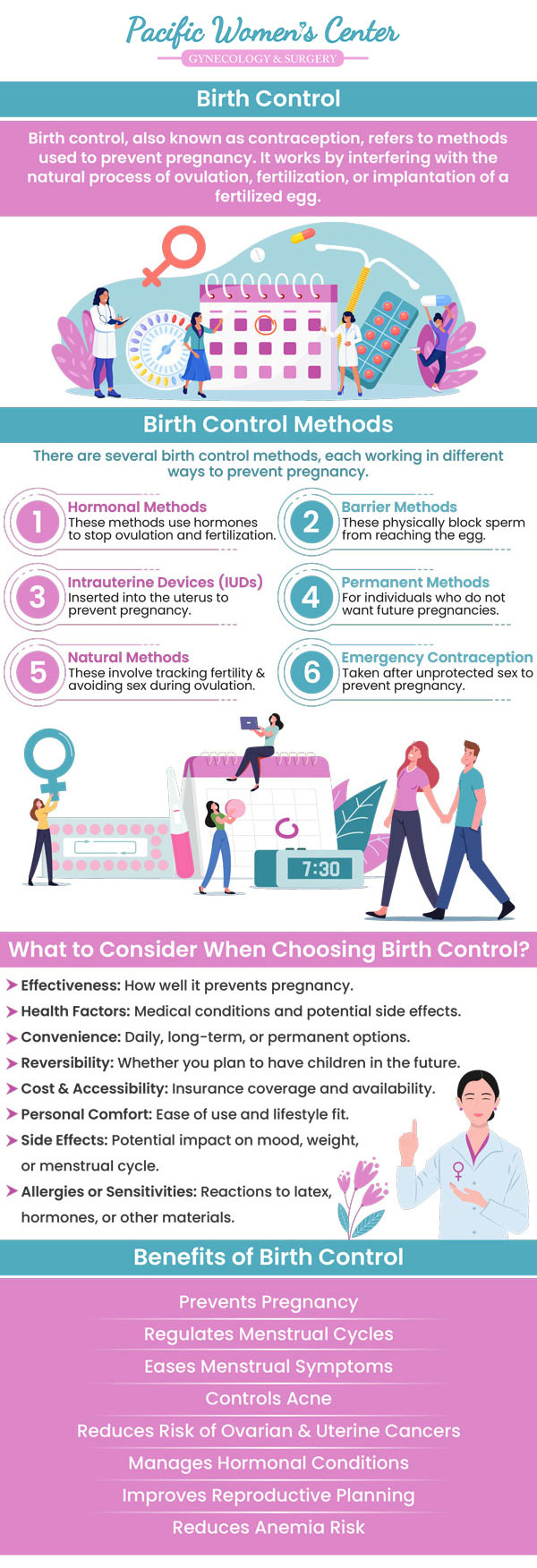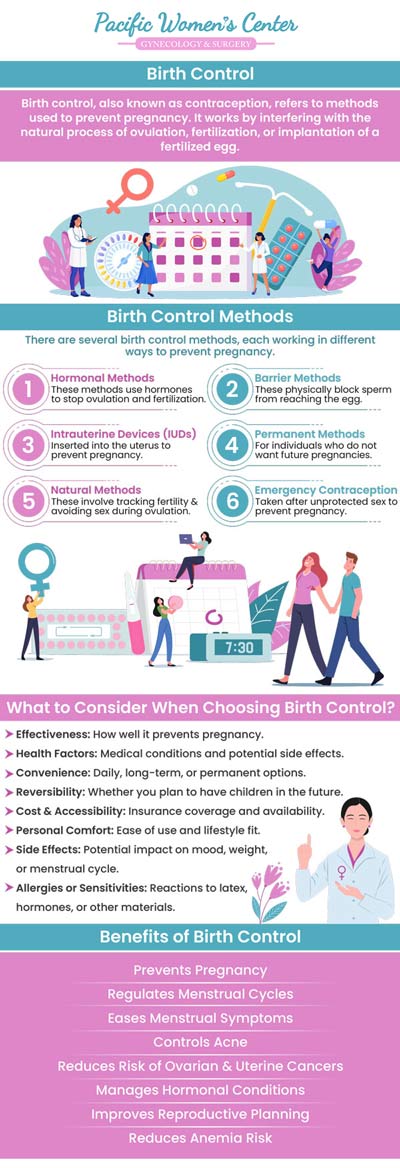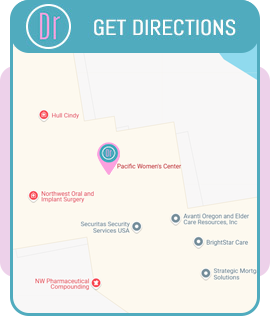Birth Control Services in Eugene, OR
Birth control is an essential part of reproductive health, and choosing the right method is crucial for your well-being. Whether you’re interested in hormonal options, IUDs, or other contraceptive methods, it’s important to find a solution that works best for your lifestyle and needs. Dr. Richard Beyerlein, MD, CPI, FACOG, and Tamara A. Stenshoel, MD, FACOG, are dedicated to offering compassionate care tailored to your needs. For more information, contact us or schedule an appointment online. We are conveniently located at 911 Country Club Rd. Suite 222, Eugene, OR 97401.




Table of Contents:
What is birth control?
What is the need for birth control?
How does birth control work?
Having a family of your own can be incredibly rewarding, and waiting for the right time to have children is essential. There are also many people who do not want to start a family, which can also be rewarding in its own right. Whatever an individual’s personal reasons are, there are many different birth control services available. They can range from temporary (oral contraceptives) to permanent (surgical procedures) to semi-permanent (reversible procedures), and also range in duration of efficacy, with some that require daily medications, monthly treatments, or yearly checkups.
Birth control, commonly referred to as contraception, is any method used to prevent conception or pregnancy. Birth control comes in many forms, including oral medications, injections, patches, surgery, implantable devices, spermicide, diaphragms, cervical caps, and both internal and external condoms.
The need for birth control is different for every individual and can range from the prevention of sexually transmitted infections to preventing conception or becoming pregnant. When preventing the transmission of STIs, only birth control methods that provide a physical barrier (such as condoms and dental dams) are effective, as most sexually transmitted infections are spread through skin-to-skin contact and through the exchange of bodily fluids, such as semen and blood. However, if birth control is needed to prevent getting pregnant, there are more effective methods than physical barriers, such as IUDs (intrauterine devices), and implantable devices that prevent ovulation (and therefore pregnancy).
Birth control works in a variety of different ways, although they each share one common goal: to prevent pregnancy. Some need to be used every time (during, before, or after intercourse), some require a regular schedule, including daily, weekly, or monthly, some are low maintenance, and others are permanent. The following birth control methods work:
Condoms/Dental Dams — These prevent sperm from entering the cervix by way of a physical barrier, typically latex, polyisoprene or polyurethane.
Spermicides — Killing sperm on contact, a spermicide can be used on its own or with other devices, such as a cervical cap, diaphragm or sponge.
Shots — Uses an injection of progestin that prevents ovulation, thereby preventing pregnancy.
Rings — An insertable ring that contains progesterone and estrogen, which prevent ovulation and therefore conception.
Patches — These are adhered to the skin and release hormones to prevent ovulation, and therefore impregnation.
Pills — These oral medications are taken daily and contain either estrogen and progestin (combination pill) or only progestin (mini pill).
Implants — These are small plastic rods that are inserted subcutaneously (under the skin). They release progestin, which blocks eggs from being released, so they cannot become fertilized and lead to pregnancy.
IUDs — Intrauterine devices come in two main types: copper and hormonal. Copper IUDs are small, T-shaped devices that are inserted into the uterus to deter sperm, as sperm do not like copper. Hormonal IUDs are also inserted into the uterus but instead of using copper, they release a small amount of progestin, which prevents ovulation, making pregnancy impossible (although no birth control method is 100% effective). Hormonal IUDs can be effective for 3 to 7 years at a time, while copper IUDs can remain efficacious for up to 12 years.
Vasectomy — This surgical procedure severs the vas deferens, the tubes that carry the sperm from the testes to the penis.
Tubal Ligation — Colloquially referred to as ‘tube tying,’ this surgical procedure cuts, ties, or blocks the fallopian tubes, which transport eggs from the ovaries to the uterus.
Dr. Richard Beyerlein MD, CPI, FACOG, and Tamara A. Stenshoel, MD, FACOG will be able to help you decide which form of birth control is best for you based on a number of different factors including your current relationships, age, desire to have children in the future, and lifestyle considerations. Some of the most popular forms of contraception include oral medication, intrauterine devices, an implant, hormonal patches, and prophylactics such as latex condoms. Some of these methods protect against sexually transmitted diseases, while others are only able to prevent pregnancy, which can be an important factor for many women who are deciding which method is best for them. We offer exceptional insight and support, so you can choose a form of contraception that is exactly right for your unique needs.
If you or someone you love needs birth control, come to Pacific Women’s Center today. Our kind and compassionate professionals are experienced providers of many different forms of birth control, so you can find the option that best suits your unique needs. Call us today to book an appointment to learn more about our birth control options, or visit our clinic conveniently located at 911 Country Club Rd. Suite 222, Eugene, OR 97401. We serve patients from Eugene OR, Springfield OR, Coburg OR, Creswell OR, Cottage Grove OR, Lowell OR, Junction City OR, and surrounding areas.

ADDITIONAL SERVICES YOU MAY NEED
❱ Abdominal Hysterectomy
❱ Bladder Lift Surgeon Q&A
❱ Cervical Cone Biopsy
❱ Colposcopy
❱ Endometrial Ablation
❱ Endometrial Biopsy
❱ Female Sexual Dysfunction
❱ Gynecological Surgery
❱ Gynecology
❱ Hormone Therapy
❱ Vaginal Hysterectomy
❱ Endometriosis Diagnosis & Care



